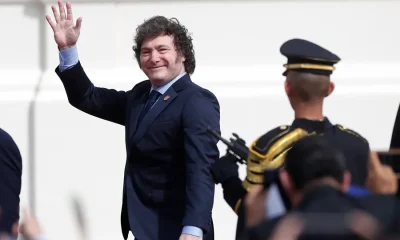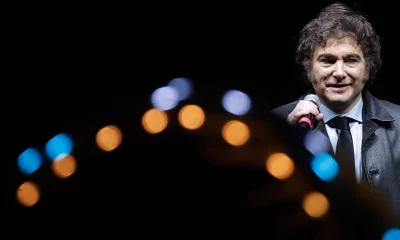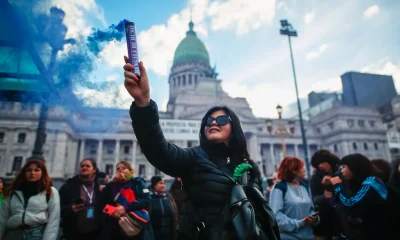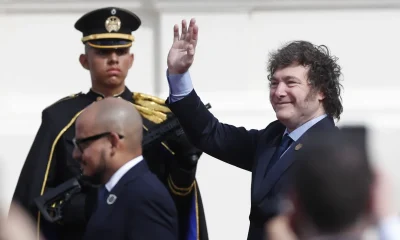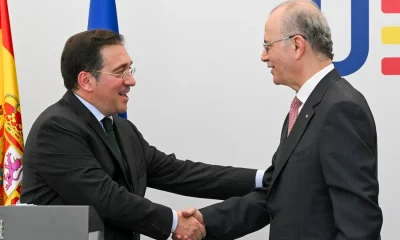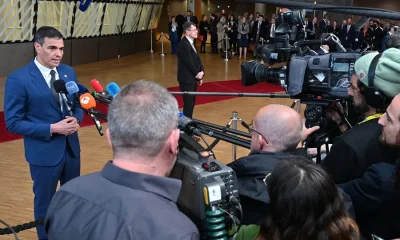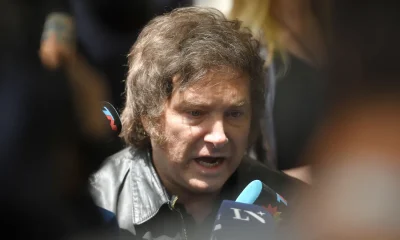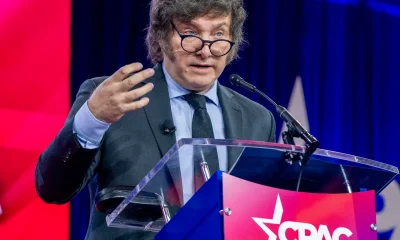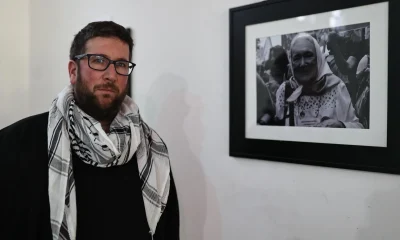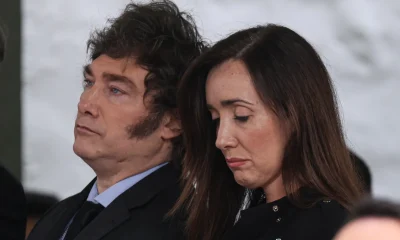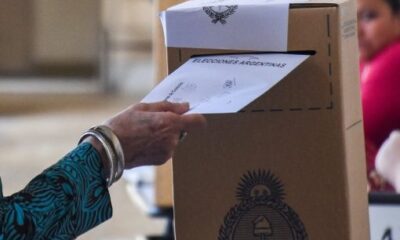International
Alberto Fernández accuses Milei of hurting the relationship with Spain and other countries
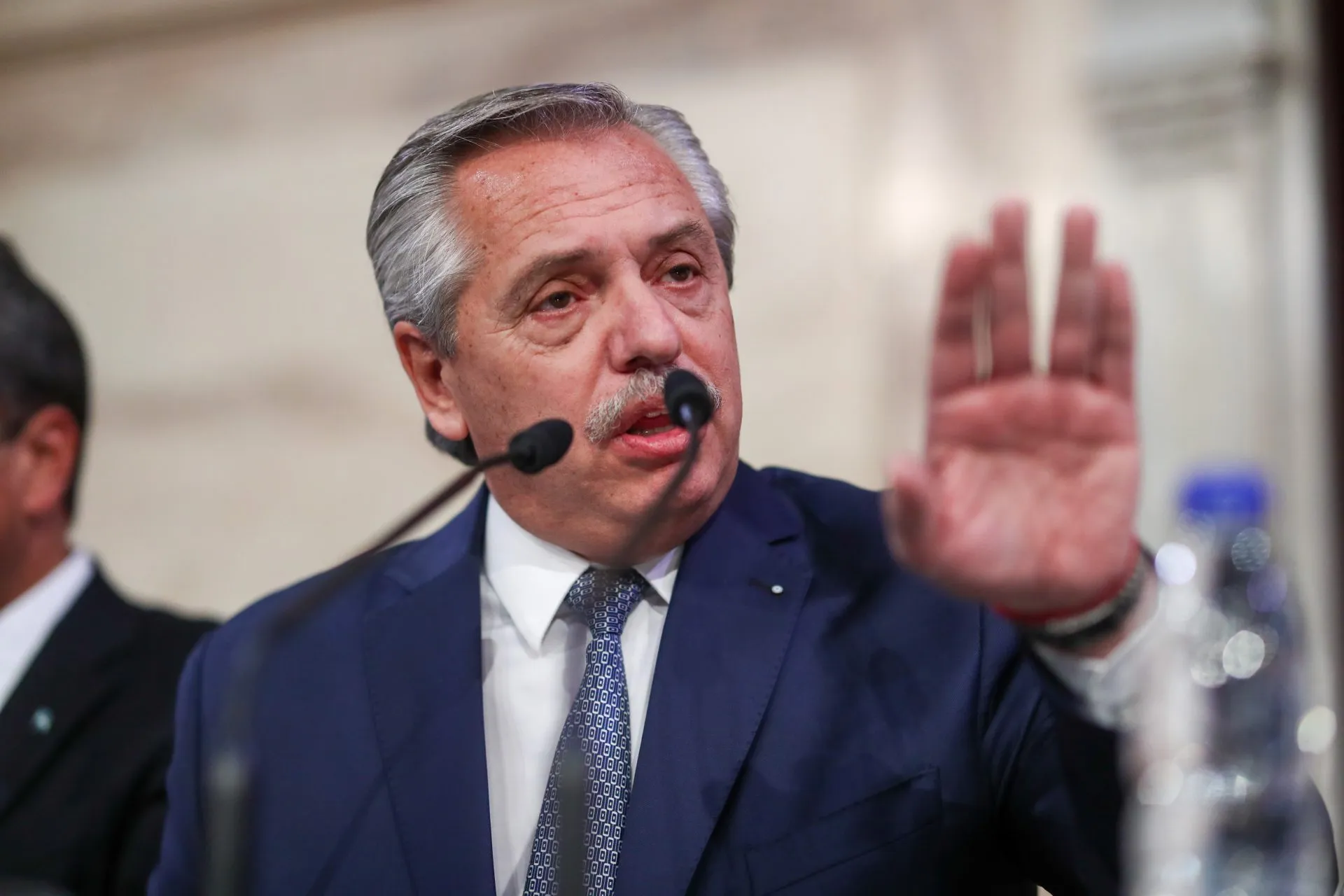
Former Argentine President Alberto Fernández (2019-2023) accused Javier Milei’s Government on Saturday of damaging bilateral relations with Spain and other countries and questioned the travels of the current president, who is currently visiting Madrid.
“The national government has hurt our relations with Spain, Brazil, Colombia, Mexico, China and much of the Arab world. Wanting to get closer to the ‘powerful’, he has taken us away from our brothers in the region and from our main commercial export destinations,” Fernández said.
Through the social network X, the Peronist leader asserted that Milei “only cares about taking his violent speech to those who, like him, screen democracy, deny climate change and repudiate respect for gender diversity.”
“In just six months, he has traveled more than 100,000 kilometers and spent millions of pesos to participate in conservative and fascist conventions, present books in which he falsifies his background, give lectures that incite violence, meet with billionaires who manipulate social networks and even show off his worrying mysticism,” he said.
Fernández pointed out that this “would have cost” Argentina less “if it had a centered chancellor” – alluding to Foreign Minister, Diana Mondino – “and its foreign policy was governed by autonomy and not by the imposition of a dehumanized ideology and submission to a power in crisis,” alluding to Milei’s decision to align Argentina’s foreign policy with the United States, in addition to Israel.
“While in Argentina the lives of its inhabitants deteriorate, we continue to pay for the absurd decisions of an ‘ambassador of light’ who is leaving us in the dark,” Fernández said, alluding to the recognition as an “international ambassador of light” that the Jewish community of Miami gave to Milei on his trip to the United States last April.
Milei, leader of the far-right formation La Libertad Avanza and who assumed the Argentine Presidency last December, left last Thursday on the presidential plane bound for Spain, in what is his first official visit to the European country, despite the fact that he does not plan to meet with Felipe VI or government authorities, but he will participate in the annual convention of the far-right Vox party.
This Friday he presented in Madrid his new book, “The path of the libertarian”, and this Saturday he met with managers of Spanish companies and is scheduled a meeting with the deputy and president of Vox, Santiago Abascal.
The central act of the visit will take place on Sunday, when he participates with other international leaders of the far-right in the annual Vox convention, Europa Viva 24, in whose edition last year he already spoke, when he was still a presidential candidate.
This year, Milei will give a speech to the attendees.
“Milei travels with state money to a rally of world fascism. That happens while your salary is depressed and the registered job is broken. Do we understand that Argentine development and the well-being of the people are not in their plans?” asked Alberto Fernández.
International
U.S. Senate Rejects Budget, Bringing Government Closer to Shutdown Amid DHS Dispute

The U.S. Senate voted on Thursday against a budget proposal in a move aimed at pressuring changes at the Department of Homeland Security (DHS), following the killing of two civilians during a deployment of immigration agents in Minneapolis.
All Senate Democrats and seven Republican lawmakers voted against the bill, which requires 60 votes to advance, pushing the country closer to a partial government shutdown that would cut funding for several agencies, including the Pentagon and the Department of Health.
The rejection came as Senate leaders and the White House continue negotiations on a separate funding package for DHS that would allow reforms to the agency. Proposed measures include banning Immigration and Customs Enforcement (ICE) agents from wearing face coverings and requiring them to use body-worn cameras during operations.
The vote took place just hours after President Donald Trump said he was “close” to reaching an agreement with Democrats and did not believe the federal government would face another shutdown, following last year’s record stoppage.
“I don’t think the Democrats want a shutdown either, so we’ll work in a bipartisan way to avoid it. Hopefully, there will be no government shutdown. We’re working on that right now,” Trump said during a Cabinet meeting at the White House.
International
Trump Says Putin Agreed to One-Week Halt in Attacks on Ukraine Amid Extreme Cold

U.S. President Donald Trump said on Thursday that he secured a commitment from Russian President Vladimir Putinto halt attacks against Ukraine for one week, citing extreme weather conditions affecting the region.
“Because of the extreme cold (…) I personally asked Putin not to attack Kyiv or other cities and towns for a week. And he agreed. He was very pleasant,” Trump said during a Cabinet meeting broadcast by the White House.
Trump acknowledged that several advisers had questioned the decision to make the call.
“A lot of people told me not to waste the call because they wouldn’t agree. And he accepted. And we’re very happy they did, because they don’t need missiles hitting their towns and cities,” the president said.
According to Trump, Ukrainian authorities reacted with surprise to the announcement but welcomed the possibility of a temporary ceasefire.
“It’s extraordinarily cold, record cold (…) They say they’ve never experienced cold like this,” he added.
Ukrainian President Volodymyr Zelensky later commented on the announcement, expressing hope that the agreement would be honored.
International
Storm Kristin Kills Five in Portugal, Leaves Nearly 500,000 Without Power

Storm Kristin, which battered Portugal with heavy rain and strong winds early Wednesday, has left at least five people dead, while nearly half a million residents remained without electricity as of Thursday, according to updated figures from authorities.
The revised death toll was confirmed to AFP by a spokesperson for the National Emergency and Civil Protection Authority (ANPEC). On Wednesday, the agency had reported four fatalities.
Meanwhile, E-Redes, the country’s electricity distribution network operator, said that around 450,000 customers were still without power, particularly in central Portugal.
Emergency services responded to approximately 1,500 incidents between midnight and 8:00 a.m. local time on Wednesday, as the storm caused widespread disruptions.
The Portuguese government described Kristin as an “extreme weather event” that inflicted significant damage across several regions of the country. At the height of the storm, as many as 850,000 households and institutions lost electricity during the early hours of Wednesday.
Several municipalities ordered the closure of schools, many of which remained shut on Thursday due to ongoing adverse conditions.
Ricardo Costa, regional deputy commander of the Leiria Fire Brigade, said residents continue to seek assistance as rainfall persists.
“Even though the rain is not extremely intense, it is causing extensive damage to homes,” he noted.
In Figueira da Foz, a coastal city in central Portugal, strong winds toppled a giant Ferris wheel, underscoring the severity of the storm.
-

 Central America4 days ago
Central America4 days agoGuatemala seizes over a ton of cocaine hidden in flour at Pacific port
-

 International4 days ago
International4 days agoHistoric snowstorm paralyzes Toronto after 60 centimeters of snow
-

 Central America3 days ago
Central America3 days agoGuatemala Police Arrest Prison Guard Caught in the Act of Extortion
-

 Central America3 days ago
Central America3 days agoHonduras swears in conservative president Asfura after disputed election
-

 Central America3 days ago
Central America3 days agoBukele leads public trust rankings as UCA survey highlights gains in security
-

 International4 days ago
International4 days agoSpain’s irregular migrant population rises to 840,000, study finds
-

 International2 days ago
International2 days agoFootball Fan Killed in Clashes After Colombian League Match
-

 International3 days ago
International3 days agoWinter Storm Fern Leaves 30 Dead and Over One Million Without Power Across the U.S.
-

 Central America2 days ago
Central America2 days agoGuatemala President Says Starlink Terminal Found Inside Prison
-

 Sin categoría3 days ago
Sin categoría3 days agoEight Killed in Series of Armed Attacks in Ecuador’s Manabí Province
-

 International3 days ago
International3 days agoDoomsday clock moves to 85 seconds before midnight amid rising global risks
-

 International4 days ago
International4 days agoRights group says nearly 6,000 killed in Iran protest crackdown
-

 International3 days ago
International3 days agoSpain approves plan to regularize up to 500,000 migrants in Historic Shift
-

 Sin categoría3 days ago
Sin categoría3 days agoEl Salvador Launches Fourth Year of Ocean Mission to Protect Marine Ecosystems
-

 International2 days ago
International2 days agoRubio Says U.S. Could Participate in Follow-Up Russia-Ukraine Talks
-

 International2 days ago
International2 days agoMissing Spanish Sailor Rescued After 11 Days Adrift in Mediterranean
-

 International4 days ago
International4 days agoVenezuela frees at least 80 political prisoners, NGO says
-

 International4 days ago
International4 days agoEU launches new probe into X over AI-generated fake nude images
-

 International17 hours ago
International17 hours agoU.S. Senate Rejects Budget, Bringing Government Closer to Shutdown Amid DHS Dispute
-

 International4 days ago
International4 days agoSevere winter storm grips U.S., leaves multiple dead as extreme cold persists
-

 International4 days ago
International4 days agoFrance debates ban on social media for children under 15
-

 International17 hours ago
International17 hours agoStorm Kristin Kills Five in Portugal, Leaves Nearly 500,000 Without Power
-

 International17 hours ago
International17 hours agoMan Arrested After Vehicle Crashes Into Jewish Institution in Brooklyn
-

 International17 hours ago
International17 hours agoTrump Says Putin Agreed to One-Week Halt in Attacks on Ukraine Amid Extreme Cold



























